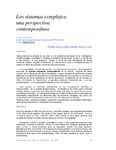| dc.contributor.author | Figueroa Nazuno, Jesús Guillermo | |
| dc.creator | FIGUEROA NAZUNO, JESUS GUILLERMO; 279654 | |
| dc.date.accessioned | 2019-02-28T03:20:33Z | |
| dc.date.available | 2019-02-28T03:20:33Z | |
| dc.date.issued | 2008-12 | |
| dc.identifier | http://repositorio.lasalle.mx/handle/lasalle/911 | |
| dc.identifier.citation | Figueroa Nazuno, J. G. (2008). Los sistemas complejos: una perspectiva contemporánea. Revista del Centro de Investigación de la Universidad La Salle, 8(30), 5-13. | es_MX |
| dc.identifier.issn | 1665-8612 | |
| dc.identifier.other | https://doi.org/10.26457/recein.v8i30.195 | |
| dc.identifier.uri | http://revistasinvestigacion.lasalle.mx/index.php/recein/article/view/195/412 | |
| dc.description.abstract | Hasta antes de la década de los años 50, los problemas centrales en la investigación científica estaban orientados y limitados al problema dimensional; es decir, el estudio de lo más grande y lo muy pequeño. Desde un punto de vista conceptual, las tareas científicas estaban dirigidas al desarrollo de instrumentos físicos o conceptuales para el estudio de estos dos grandes horizontes del conocimiento. En la actualidad, una serie de eventos —en cierta forma inconexos— han orientado la búsqueda de nuevos esquemas interpretativos en la ciencia. Algunos de estos eventos son el desarrollo de las computadoras, la gran cantidad de problemas sociales dados por el crecimiento de población, el explosivo desarrollo del comercio y, con esto, el surgimiento de serios problemas en teoría económica, el desarrollo de las teorías en física, en biología, en bioquímica y en genética molecular; fenómenos que —por sus características— no ha sido posible estudiar en la forma clásica. Esto, aunado al creciente escepticismo en las concepciones atomistas y reduccionistas —en su sentido epistemológico— ha llevado en los últimos años a intentar estudiar, desde un punto de vista diferente del tradicional, toda una clase de fenómenos: los sistemas complejos. En el presente trabajo se muestra el desarrollo de este esquema interpretativo describiendo los diferentes tipos de sistemas complejos, así como una caracterización de los fenómenos y técnicas más utilizadas para su estudio. | es_MX |
| dc.description.abstract | Up to the decade of 1950, the core issues in scientific research were targeted and limited to the dimensional problem: the study of the largest and of the very small. From a conceptual point of view, scientific tasks were aimed to developing physical and conceptual tools for the study of these two great horizons of knowledge. At present, a series of events —unrelated in a way— have guided the search for new interpretive schemes in science. Some of these events are computer developing, the large number of social problems given by population growth, the trade explosive development and, next to this, the emerging of serious problems in economic theory, the development of new theories in physics, biology, biochemistry, and molecular genetics; phenomena that, given their characteristics, have not been possible to study under a classical way. Over recent years, this issue (coupled with growing skepticism and reductionism & atomist conceptions —in their epistemological sense) has led to trying to study, from a different angle to the traditional, a whole class of phenomena: complex systems. This paper shows the development of this interpretive scheme by describing various types of complex systems, as well as the phenomena and techniques used for their study. | es_MX |
| dc.format | application/pdf | es_MX |
| dc.language.iso | spa | es_MX |
| dc.publisher | Universidad La Salle México, Dirección de Posgrado e Investigación | es_MX |
| dc.relation | http://revistasinvestigacion.lasalle.mx/index.php/recein/article/view/195/412 | |
| dc.rights | Acceso abierto | es_MX |
| dc.rights.uri | http://creativecommons.org/licenses/by-nc-nd/4.0 | * |
| dc.subject | Sistemas complejos | es_MX |
| dc.subject | Esquemas interpretativos | es_MX |
| dc.subject | No-linealidad | es_MX |
| dc.subject | Cibernética | es_MX |
| dc.subject | Teoría general de sistemas | es_MX |
| dc.subject | Simulación computacional | es_MX |
| dc.subject | Complex systems | es_MX |
| dc.subject | Interpretive schemes | es_MX |
| dc.subject | Non-linearity | es_MX |
| dc.subject | Cybernetics | es_MX |
| dc.subject | Systems general theory | es_MX |
| dc.subject | Computer simulation | es_MX |
| dc.subject.classification | INGENIERÍA Y TECNOLOGÍA::CIENCIAS TECNOLÓGICAS::TECNOLOGÍA DE LOS ORDENADORES | es_MX |
| dc.subject.other | Teoría de sistemas | es_MX |
| dc.title | Los sistemas complejos: una perspectiva contemporánea | es_MX |
| dc.type | article | es_MX |
| dc.identificator | 7||33||3304 | es_MX |
| dc.audience | generalPublic | es_MX |







